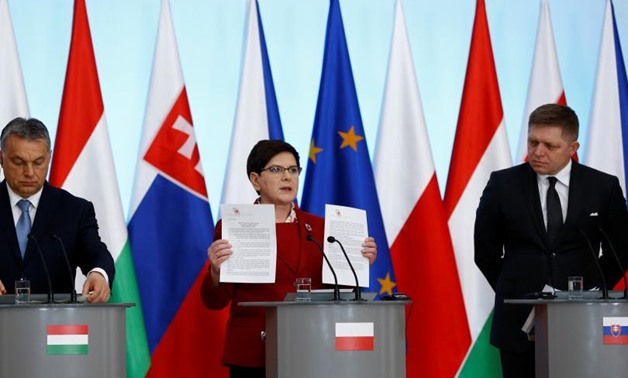
Visegrad Group (V4) member nations' Prime Ministers, Hungary's Viktor Orban, Poland's Beata Szydlo and Slovakia's Robert Fico, attend a news conference during a summit in Warsaw, Poland March 2, 2017 – Reuters
CAIRO – 3 July 2017: President Abdel Fatah al-Sisi departed on Sunday for an official visit to Hungary to attend an extraordinary summit of the Visegrad Group.
The president is scheduled to have meetings during the visit with top officials in Hungary, including President Janos Ader, Prime Minister Viktor Orban and the parliament's speaker Laszlo Kover.
Here are 15 things you should know about the Visegrad Group and its relations with Egypt:
1)Visegrad Group or V4 is the political and cultural alliance of four Central European states - Slovakia, Poland, Hungary, and Czech Republic – for the purpose of integration and economic, military, and energy cooperation.
2)The name dates back to the summit held in 1993 comprising leaders of Hungary, Poland, and Czechoslovakia in the Hungarian castle town of Visegrad.
3)The group was first called the Visegrad Triangle before the dissolution of Czechoslovakia into two countries in 1993, when it became the Czech Republic and Slovakia.
4)All alliance members joined the European Union (EU) in May 2004 as they started accession procedure in mid-1990s.
5)The group is not known among Middle Easterners as it does not have intensive activities in the region and does not aspire to rise politically at the expense of the EU.
6)The president’s visit is not considered the first Egyptian participation in the alliance’s meeting as former Minister of Foreign Affairs Nabil Fahmy took part in a conference held in Slovakia for foreign ministers in May 2014.
7)Relations between Egypt and Visegrad have evolved, and the Hungarian Foreign Affairs Minister Péter Szijjártó visited his Egyptian Counterpart Sameh Shoukry in Cairo in June 2016 to discuss mutual interests and cooperation opportunities between Egypt and the group members.
8)A few years ago, Egypt was able to harness support from the countries in the alliance for its internal policies regarding combating violence, extremism, and terrorism, and for the ouster of the Muslim Brotherhood regime in 2013.
9)Shoukry received on December 20, 2016 his counterparts from Visegrad Group countries to discuss cooperation plans and mechanisms.
10)The only non-member states that have been invited to Visegrad meetings are Egypt, Germany, and Japan.
11)Egypt’s target is benefitting from the economic experiences of these high-income countries characterized by stable economies, and great investment opportunities, achieving economic leaps over a very short span of time.
12)Egypt aims to expand its exports to those countries as they have already risen throughout the last few years. Exports included vegetables, fruits, cotton, cement, fertilizers, carpets, electronic devices, glass, aluminum, bio-chemicals, rubber, fuel, clothing, and accessories.
13)Citizens of Visegrad Group countries consider Egypt a top destination for cultural and entertainment tourism heading particularly to Red Sea beaches. Hence, Egypt is working on increasing tourists numbers from these countries.
14)Economic coordination mechanisms between Egypt and Visegrad Group members included new cooperation studies in the fields of agriculture, water treatment, railway, equipment manufacturing, and medical tourism. That is in addition to encouraging companies of both sides to enter in dual partnerships to open third markets in the Middle East and Africa, and to exchange technologies.
15)Egypt and Visegrad Group countries are expected to build up upon the security cooperation protocol signed by both the Egyptian president and the Hungarian prime-minister Viktor Orban during the former’s visit to Budapest in June 2015, especially in the field of counter terrorism.


Comments
Leave a Comment